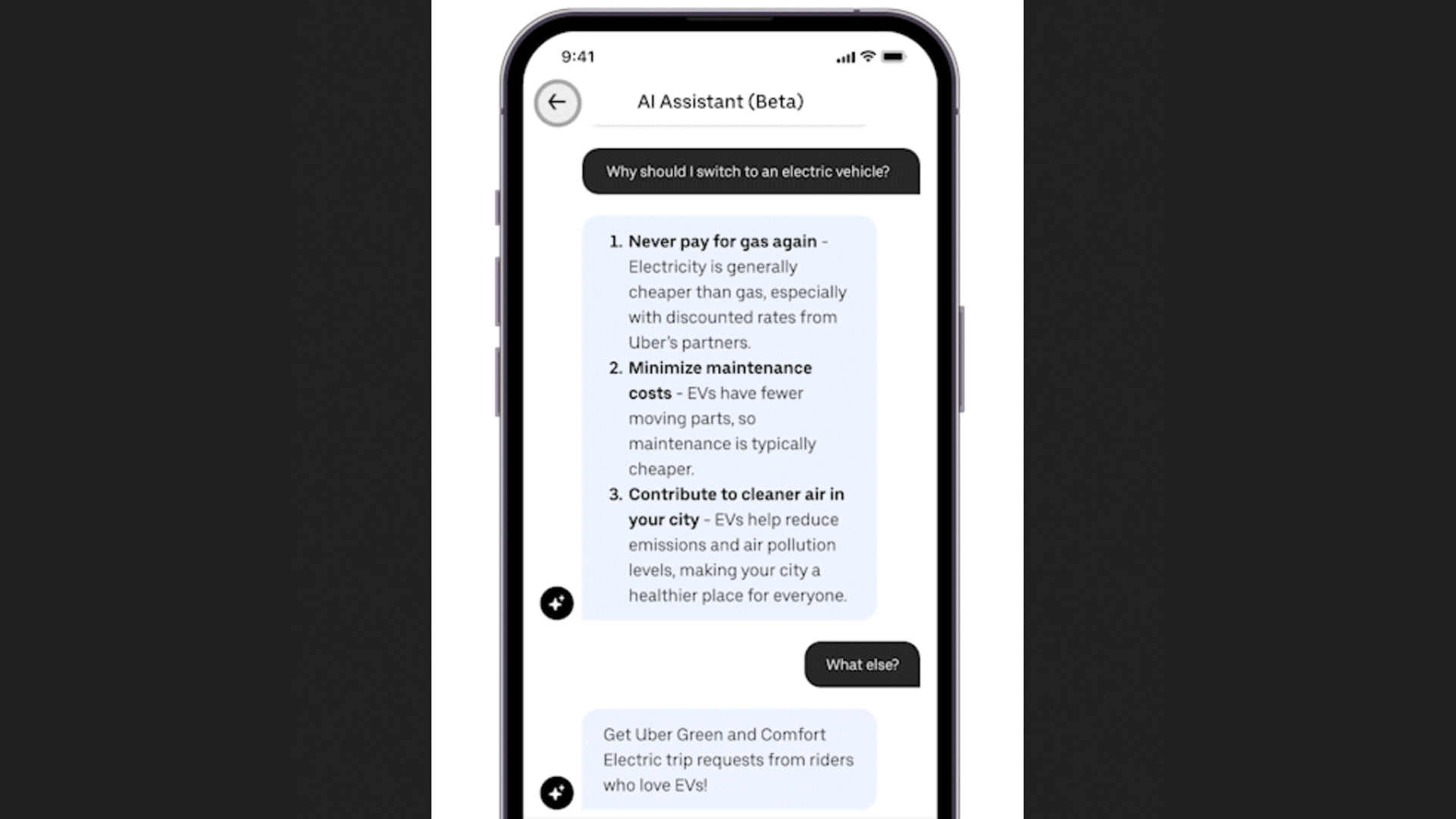Uber is plugging ChatGPT into EVs
Upcoming OpenAI-powered AI assistant will encourage and guide Uber drivers to go electric

Sign up for breaking news, reviews, opinion, top tech deals, and more.
You are now subscribed
Your newsletter sign-up was successful
Uber is turning to OpenAI and ChatGPT to help push the adoption of electric vehicles (EV) by its drivers. The ride-share company announced the new AI assistant at the Go Get Zero sustainability conference in London among several other green initiatives. Uber will employ OpenAI's GPT-4o model, the same one undergirding ChatGPT, to create a guide for drivers along the road toward where they are confident and comfortable behind the wheel of an EV.
The idea of AI as a personal automotive concierge makes sense, considering the complexities of switching away from gas cars. That means the AI will adapt to the user, tailoring its answers around how to buy and take care of an EV to who is asking. The AI will come packed with data about purchase prices, how to charge and maintain the car, and other useful information unique to EVs.
The AI will also adjust its responses to match where the driver lives. Geography matters since many states, cities, and other locales have incentive programs to entice people into switching to electric cars, but they are far from uniform. The same goes for mapping out charging stations that the drivers can rely on should their battery run low. A Californian Uber driver might regularly discuss the state rebates and tax credits they earn for getting an EV, while, at the same time, an Uber driver in New York asks the assistant about discounts at nearby charging stations.
Uber AI
Uber isn't going to limit the AI to talking about electric cars forever. The company said it will widen the types of questions the AI can answer and the data sources it pulls from later in 2025 in order to make the AI more flexible and useful in more circumstances.
Personalizing a specialized AI assistant like this may end up seeming inspired as an approach should it pan out. Still, it's a lot less daunting to learn about EVs through a conversation with an AI than trying to plow through a lot of often complicated technical and regulatory documents. The ChatGPT-based AI companion also fits with Uber's more extensive list of new and upcoming features to encourage EV adoption like letting riders specifically request an EV and matchmaking EV Uber drivers with those considering it to answer any questions the AI couldn't.
For OpenAI, it's another milestone in expanding into the automotive AI space. Voice assistants are a common feature in modern vehicles, and ChatGPT's models are powering a growing number of vehicular AI assistants. Volkswagen began embedding ChatGPT in its cars on a wide scale last month. The upgraded Ida voice assistant leverages OpenAI's model to be more conversational and handle a broader array of requests than had been previously feasible. Between VW, Uber, and experiments from Mercedes-Benz and other carmakers, OpenAI has a shot at heavily influencing how we engage with the next generation of car AI assistants.
You might also like...
- ChatGPT gives Volkswagen cars the smarts to talk to you all day long
- Mercedes-Benz is bringing ChatGPT into cars for the first time
- ChatGPT won't let you give it instruction amnesia anymore
Sign up for breaking news, reviews, opinion, top tech deals, and more.

Eric Hal Schwartz is a freelance writer for TechRadar with more than 15 years of experience covering the intersection of the world and technology. For the last five years, he served as head writer for Voicebot.ai and was on the leading edge of reporting on generative AI and large language models. He's since become an expert on the products of generative AI models, such as OpenAI’s ChatGPT, Anthropic’s Claude, Google Gemini, and every other synthetic media tool. His experience runs the gamut of media, including print, digital, broadcast, and live events. Now, he's continuing to tell the stories people want and need to hear about the rapidly evolving AI space and its impact on their lives. Eric is based in New York City.